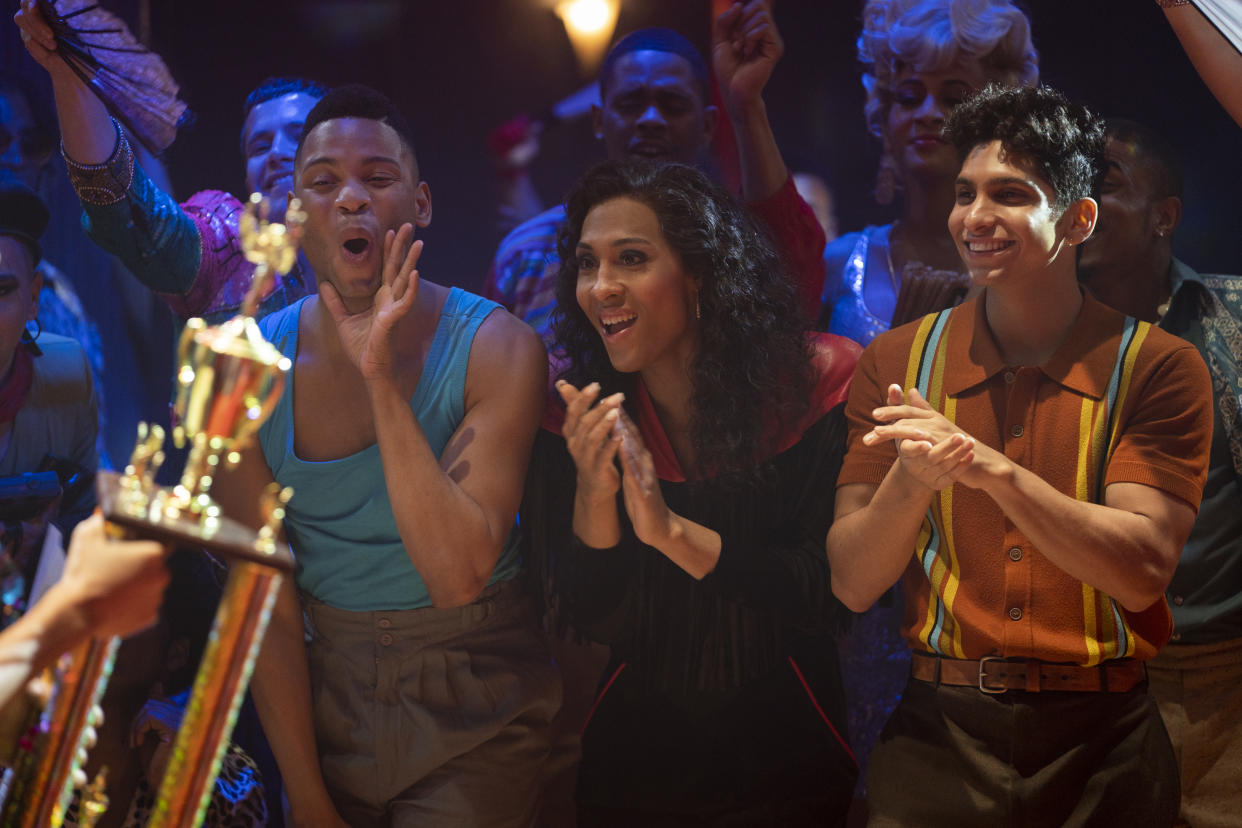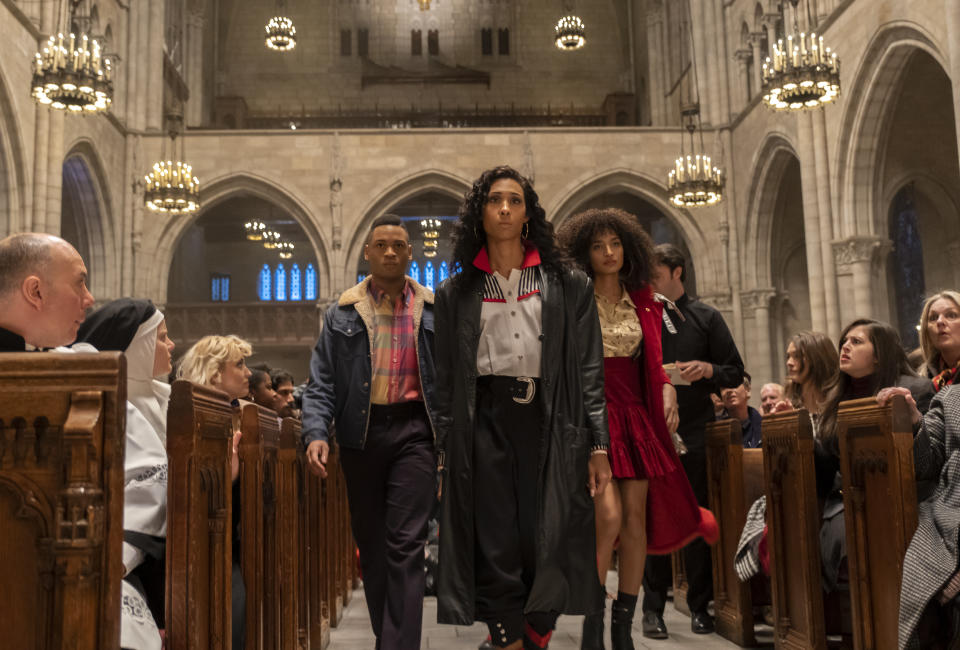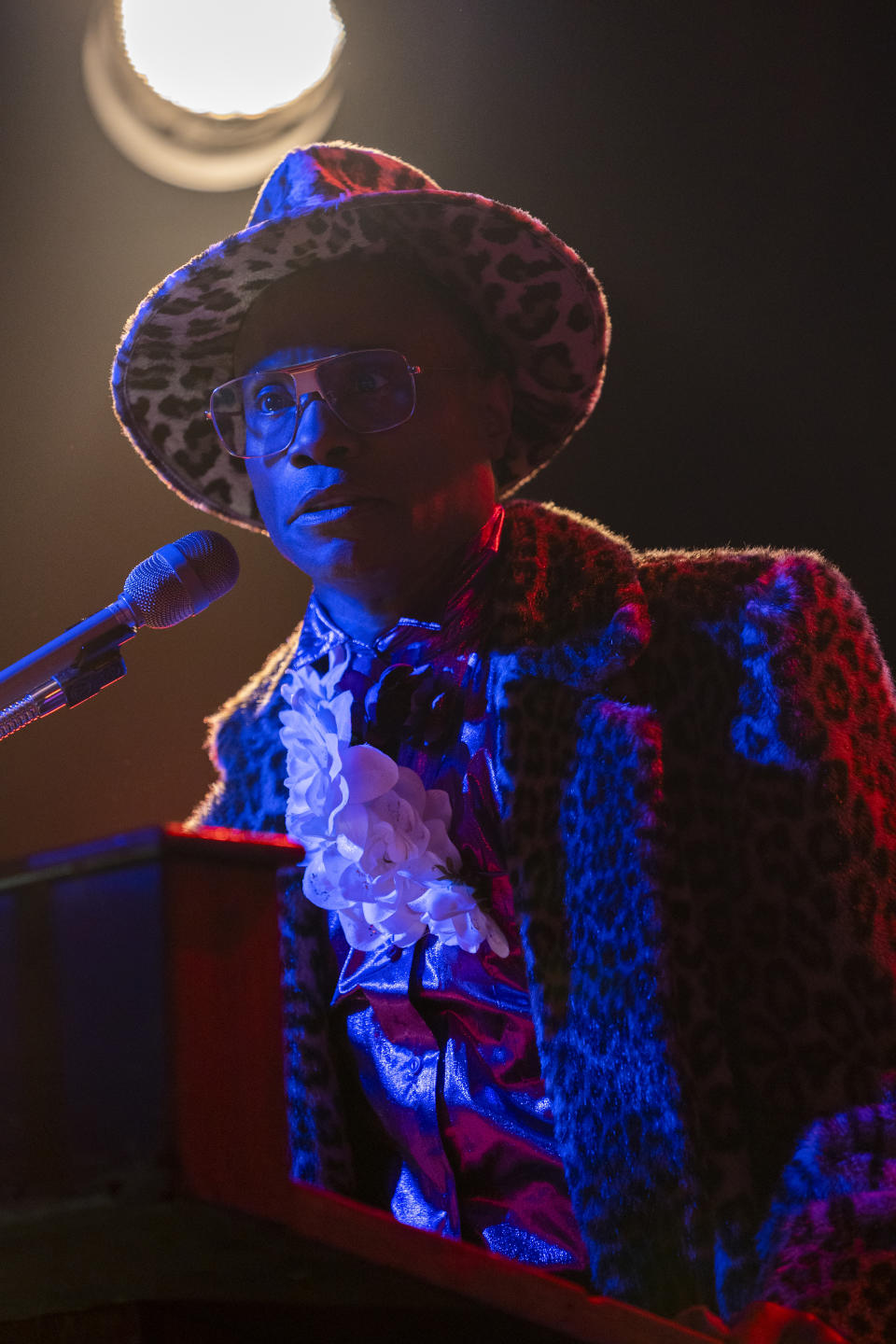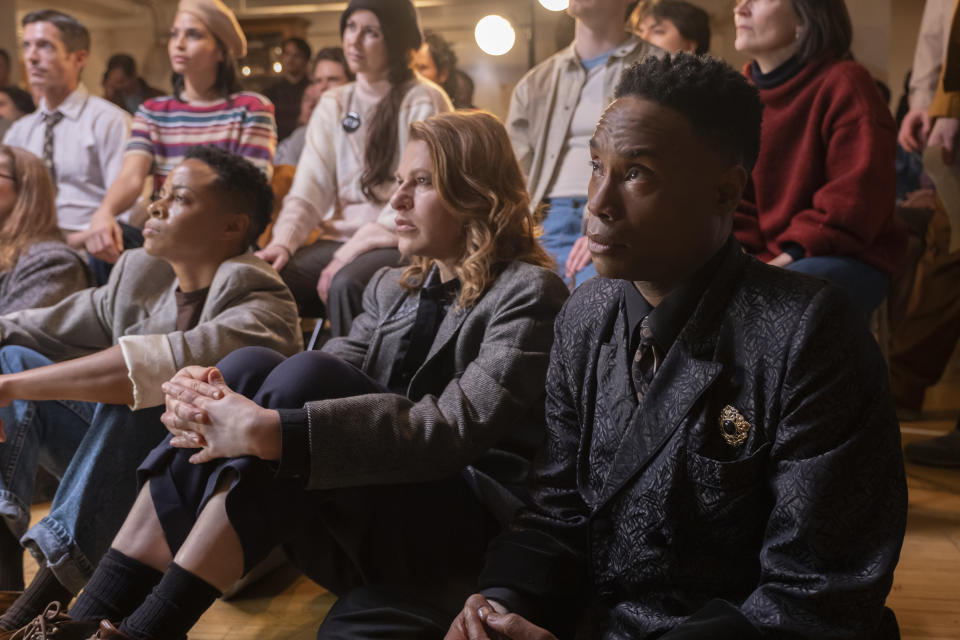'Pose': Behind the scenes of the visionary second season with creators Ryan Murphy and Janet Mock

On the FX drama Pose, every person is deserving of a story. Just look at the extras. When FX invited a busload of journalists to the Pose set in May, the ballroom was packed with background characters of every conceivable age, race and gender identity, decked out in a full range of circa-1990 fashion. Under a lazily spinning disco ball, there were gold lamé gowns and color-blocked jumpsuits, flouncy silk blouses and sailor suits, a headpiece covered in fake flowers and a pink neck ruffle that split the difference between Queen Elizabeth and Christian Lacroix. No two ballroom attendees looked alike — none, that is, except for a pair of suburbanites in mom jeans, tourists in an underground culture that Madonna’s “Vogue” had just nudged toward the mainstream.
Against this fashionable backdrop, the stars of Pose began to emerge. At the front of the room: Golden Globe nominee and red carpet slayer Billy Porter as Pray Tell, the charismatic emcee of the balls, where gay and trans New Yorkers walk the runway like they’re competing in a supermodel Olympics. They’re vying for plastic trophies (dozens of which are piled around the outskirts of the set, swaddled in bubble wrap) but it’s not really about the prizes; it’s about earning the respect of the queer community, and feeling like a superstar for a few moments when the outside world pretends you don’t exist.
Standing to one side was Blanca, the HIV-positive trans protagonist played by Mj Rodriguez, who declared herself a “house mother” in Season 1 and built a family from the ground up. She’s surrounded by her “children”: stunning heartbreaker Angel (Indya Moore), ambitious young dancer Damon (Ryan Jamaal Swain), bad-boy-made-good Ricky (Dyllon Burnside) and mischief-maker Lil Papi (Angel Bismark Curiel). Elektra (Dominique Jackson), the beautiful grand dame of the ballroom, sat on the opposite side of the runway, a recent defector from Blanca’s house. And waiting outside the door was desperate-to-fit-in Candy (Angelica Ross), ready to make an entrance that the visiting journalists were begged not to spoil. Suffice to say, it happens in Episode 4, and it makes an impression.

But back to the present. Last night, the second season of Pose premiered on FX, where the series has been steadily picking up viewers since its debut last summer. Season 1 (now streaming on Netflix), which unfolded over one year between 1987 and 1988, told the self-contained story of how compassionate and resourceful Blanca built her house and triumphed in the ballroom scene. Season 2 takes place in 1990, when Madonna’s “Vogue” video introduced ballroom moves to the mainstream. At the same time, New York City’s LGBTQ community was being ravaged by the AIDS virus, the death toll climbing every day.
The strange intersection of MTV and HIV is where our characters found themselves in last night’s season premiere. The packed episode opened with Blanca and Pray Tell visiting Hart Island in the outer Bronx, where thousands of early AIDS victims were buried anonymously in mass graves. “I didn't know anything about Hart Island until they told me about it,” Porter told journalists during the set visit. And that’s just why producer Ryan Murphy insisted they shoot the scene on location, re-creating the horrors for a new generation.

“You watch it and it reminds you of the Holocaust, the images of these mass graves, people wearing hazmat outfits — even though they're dead, they still thought they could catch it,” said Murphy. “So imagine a crew of 500 people going to the furthest, remote, surrounded-by-water area of New York. That was expensive, but emotional, and it’s history. I feel like LGBTQ history is so important and so undocumented, and I think millions of people will now learn about this and be outraged.”
The five-person writing staff of Pose, which includes an unprecedented two trans women (writer, producer and director Janet Mock and former Transparent writer Our Lady J), is unapologetic about using their platform to teach LGBTQ history. “I recognize that Pose, in a lot of ways, is an entry point for folks when it comes to the community,” said writer Steven Canals. “There are moments on our show where we're very clearly talking to the audience and we are giving you a lesson, finger-wagging, and that's intentional.”

For all its nutritional value, Pose still goes down like candy — even if it’s sometimes bittersweet.
“The thing that I'm most proud of on this show,” Mock told the journalists, “is that we've been able to find a balance between the fantasy of the ballroom — the creativity, the joy, the color, the glitz, the glamor — but then also keep it deeply anchored in the struggle of the real-life experiences of these people outside of the ballroom.”

In the Season 2 premiere, the ballroom featured one of its most spectacular looks to date: Elektra’s Marie Antoinette-themed dress, with a metal skirt orbited by carousel horses and shoulders that extended upwards to create a headless illusion. The exuberant theatrics of the runway provide a joyous escape from the disease and discrimination experienced daily by Blanca’s family — just as they did for the gay community in real life.
“Having lived through it, I remember a lot of what these spaces were about: the club space, the circuit party space, the designer drug space on the weekends,” said Broadway veteran Porter. “It wasn’t about checking out, because there wasn't any time to check out — but just for a moment, blocking your brain from thinking about the tragedy, just for a moment, so that you could go back and keep fighting and keep working. What I love about this show, is that it shows that part of what it means to consciously choose joy.”
Joy is always a possibility in the world of Pose, embraced by the characters wherever they can find it. In the second season, they’re going to need it more than ever.

“One of our characters… it’s going to be tough on the audience,” Mock said with a meaningful pause. “Obviously we wouldn’t put all our characters through that, but there are some sacrifices that must be made. What’s really impactful is that you fell in love with these characters in Season 1. And you finally love trans people and queer people and LGBT people of color, for the first time, for the many people who don't have any interactions with them in their lives. In Season 2, you must deal with the consequences of not taking action. You have to deal with the embodiment of the systems that they're dealing with.”
In other words, Mock and the creators don’t want the audience to passively root for Blanca and Pray Tell; they want to inspire viewers to advocate for change. “We’re going to get into some HIV-AIDS activism this season,” said Our Lady J, herself an activist in the HIV-positive community. “And that doesn't come from a place of comfort, that comes from a place of extreme discomfort and anger. In these times, we're all feeling a bit uncomfortable, and we're all feeling a bit angry. And what do you do with that? What do you do when life presents such a challenge? And our characters really live in the solution. Instead of being victimized, they are taking on their own agency and moving forward.”

Back in May, the journalists were ushered from the ballroom and escorted through some of the show’s other sets. There was the House Evangelista apartment, Blanca’s estranged mother’s cookbook displayed lovingly in the tiny kitchen; a basement S&M club with a velvet-upholstered dungeon; and half-hidden behind a wall, a funeral home. It was a whole world, occupied by a subculture that much of America never knew existed before Pose.
The experience of watching Pose can feel like watching TV in a parallel universe, one where television hasn’t always been primarily created by and for straight, white men. It’s a universe where a black, transgender prostitute is someone whose modeling career you root for, not a murder victim who shows up for five minutes of a crime procedural. It’s a universe where the fight against AIDS is shown, accurately, to have been driven by fearless gay activists, not straight men swooping in a la Philadelphia and Dallas Buyers Club. It’s a universe where mothers like Blanca aren’t related to their chosen children, but love them more fiercely than their biological families ever could. And it’s a universe where prestige TV favors hope over relentless darkness.
“Does every episode end on a happy note? No,” said Murphy. “But I think it ends on a hopeful note. And I think hope is the important thing.”
Read more from Yahoo Entertainment:
The Crazy, Fabulous Story Behind 'To Wong Foo, Thanks for Everything, Julie Newmar'
Before #OscarsSoWhite: The Forgotten Story of Queer Nation's 1992 Academy Awards Protest
Want daily pop culture news delivered to your inbox? Sign up here for Yahoo Entertainment & Lifestyle's newsletter.



